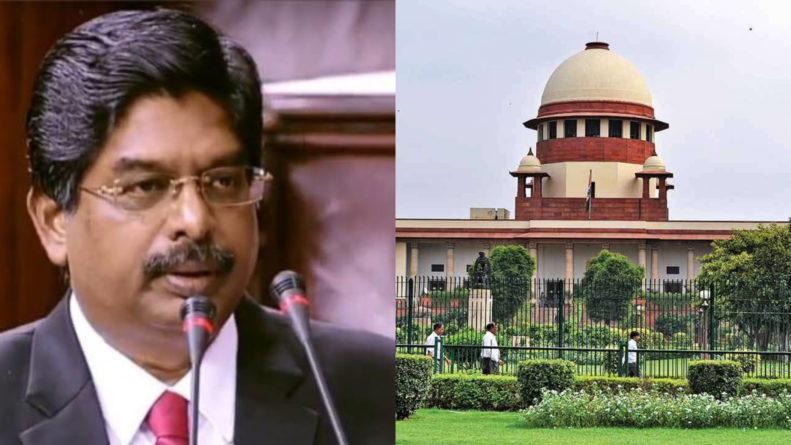A judiciary that markedly fails to reflect the social composition of the nation possess a serious constitutional challenge: Wilson Member of RS Writes letter to President
(Judicial Quest News Network)
“A free, robust and impartial Judiciary is essential to deliver good governance, and to keep our democracy healthy and vibrant. When the citizens’ rights are protected by a Constitutional Court, the natural corollary is that good governance is delivered.” P.Wilson writes in his letter.“
In a significant development a letter written by Rajaya Sabha Member and Senior Advocate Wilson to the President of India has raised certain serious concerns pertaining to the diversity in judicial appointments, particularly in Supreme Court.
Wilson narrates that “Judicial diversity is fundamental to the quality of judging. Many social groups are poorly represented in the Judiciary. This may mean their rights are not being properly safeguarded, and may eventually lead to the infringement and violation of such rights. People of this country are afraid that a very narrow, homogeneous group of Judges belonging to certain classes are not necessarily going to reflect the views and values of society as a whole, particularly on issues involving diverse, cultural and generational matters because they would require more perspectives, as the Judges would interpret and enforce law based on their own background.”
He further sys that there is a greater likelihood of a violation of the rights of under-represented persons and discrimination. He questions
“How else can one explain the lack of more number of women and judges from historically oppressed sections of society?”
Wilsons adds that it is extremely important to support and protect diversity because by valuing individuals and groups in a manner free from prejudice, and by fostering a climate where equity and mutual respect are intrinsic, we create a fair society, which is needed for a country to run smoothly.
DIVERSITY IMPROVES QUALITY OF JUDGEMENTS:
Increasing the diversity of our Union judiciary is also about improving the quality of judgments. It means that there will be more varied experiences and perspectives from which to draw on in interpreting and applying the law. A diverse Bench’s collective decision would include complimentary perspectives while laying down a law, as compared to a homogenous one.
He asserts that On a close scrutiny of composition of Judges which laid down certain laws relating to rights of any community affecting them across the country, it would be apparent that the views drastically changes when they lack diversity in the bench.
IMPROVING PUBLIC FAITH & CONFIDENCE IN THE INSTITUTION:
A more diverse Union judiciary would increase public confidence and gain greater support from its citizen. If the citizens know they are being properly represented in the Courts and that there are people there who share the same background as them they would be more comfortable and willing to comply with the judicial pronouncements without any demur.
It would also be beneficial to the judges because if they have a diverse pool of people from different backgrounds, gender and cultures in the judiciary then there would be more skills and experiences to gain from when passing judgment as it would equip the judges with the experience, views and values they would need to make good and fair judgments.
Wilson in his letter strongly urges the President to make it mandatory in the appointments to Union Judiciary while keeping intact the other requirements.
[Read Letter]
In a significant development a letter written by Rajaya Sabha Member and Senior Advocate Wilson to the President of India has raised certain serious concerns pertaining to the diversity in judicial appointments, particularly in Supreme Court.
Wilson narrates that “Judicial diversity is fundamental to the quality of judging. Many social groups are poorly represented in the Judiciary. This may mean their rights are not being properly safeguarded, and may eventually lead to the infringement and violation of such rights. People of this country are afraid that a very narrow, homogeneous group of Judges belonging to certain classes are not necessarily going to reflect the views and values of society as a whole, particularly on issues involving diverse, cultural and generational matters because they would require more perspectives, as the Judges would interpret and enforce law based on their own background.”
He further sys that there is a greater likelihood of a violation of the rights of under-represented persons and discrimination. He questions
“How else can one explain the lack of more number of women and judges from historically oppressed sections of society?”
Wilsons adds that it is extremely important to support and protect diversity because by valuing individuals and groups in a manner free from prejudice, and by fostering a climate where equity and mutual respect are intrinsic, we create a fair society, which is needed for a country to run smoothly.
DIVERSITY IMPROVES QUALITY OF JUDGEMENTS:
Increasing the diversity of our Union judiciary is also about improving the quality of judgments. It means that there will be more varied experiences and perspectives from which to draw on in interpreting and applying the law. A diverse Bench’s collective decision would include complimentary perspectives while laying down a law, as compared to a homogenous one.
He asserts that On a close scrutiny of composition of Judges which laid down certain laws relating to rights of any community affecting them across the country, it would be apparent that the views drastically changes when they lack diversity in the bench.
IMPROVING PUBLIC FAITH & CONFIDENCE IN THE INSTITUTION:
A more diverse Union judiciary would increase public confidence and gain greater support from its citizen. If the citizens know they are being properly represented in the Courts and that there are people there who share the same background as them they would be more comfortable and willing to comply with the judicial pronouncements without any demur.
It would also be beneficial to the judges because if they have a diverse pool of people from different backgrounds, gender and cultures in the judiciary then there would be more skills and experiences to gain from when passing judgment as it would equip the judges with the experience, views and values they would need to make good and fair judgments.
Wilson in his letter strongly urges the President to make it mandatory in the appointments to Union Judiciary while keeping intact the other requirements.
[Read Letter]
In a significant development a letter written by Rajaya Sabha Member and Senior Advocate Wilson to the President of India has raised certain serious concerns pertaining to the diversity in judicial appointments, particularly in Supreme Court.
Wilson narrates that “Judicial diversity is fundamental to the quality of judging. Many social groups are poorly represented in the Judiciary. This may mean their rights are not being properly safeguarded, and may eventually lead to the infringement and violation of such rights. People of this country are afraid that a very narrow, homogeneous group of Judges belonging to certain classes are not necessarily going to reflect the views and values of society as a whole, particularly on issues involving diverse, cultural and generational matters because they would require more perspectives, as the Judges would interpret and enforce law based on their own background.”
He further sys that there is a greater likelihood of a violation of the rights of under-represented persons and discrimination. He questions
“How else can one explain the lack of more number of women and judges from historically oppressed sections of society?”
Wilsons adds that it is extremely important to support and protect diversity because by valuing individuals and groups in a manner free from prejudice, and by fostering a climate where equity and mutual respect are intrinsic, we create a fair society, which is needed for a country to run smoothly.
DIVERSITY IMPROVES QUALITY OF JUDGEMENTS:
Increasing the diversity of our Union judiciary is also about improving the quality of judgments. It means that there will be more varied experiences and perspectives from which to draw on in interpreting and applying the law. A diverse Bench’s collective decision would include complimentary perspectives while laying down a law, as compared to a homogenous one.
He asserts that On a close scrutiny of composition of Judges which laid down certain laws relating to rights of any community affecting them across the country, it would be apparent that the views drastically changes when they lack diversity in the bench.
IMPROVING PUBLIC FAITH & CONFIDENCE IN THE INSTITUTION:
A more diverse Union judiciary would increase public confidence and gain greater support from its citizen. If the citizens know they are being properly represented in the Courts and that there are people there who share the same background as them they would be more comfortable and willing to comply with the judicial pronouncements without any demur.
It would also be beneficial to the judges because if they have a diverse pool of people from different backgrounds, gender and cultures in the judiciary then there would be more skills and experiences to gain from when passing judgment as it would equip the judges with the experience, views and values they would need to make good and fair judgments.
Wilson in his letter strongly urges the President to make it mandatory in the appointments to Union Judiciary while keeping intact the other requirements.
[Read Letter]




